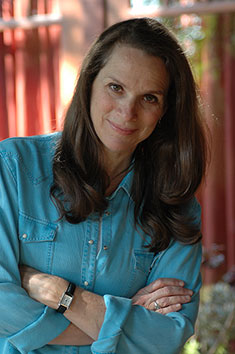Pearlie: When you give love, you give it with your whole being. I don't think I could love my children less, no matter what. Even my son-in-laws. My family is my life.
*
It is a beautiful, crisp morning in New York. By 10, Tessie and I are still wearing our flannel pj's, with no intention of getting dressed. We've already broken into a box of chocolates I've brought with me from L.A. She likes the chocolate-covered honeycomb. "We're not eating, just noshing," she explains.
A lifelong Democrat, she loves to talk politics and is presently castigating Paula Jones. "Maybe she really instigated him," she says, referring to President Clinton. "This she wouldn't tell you."
We break out the cards, and I "wash" or shuffle them. The cards fly, 10 to her, 10 to me. She turns over a king of spades, double points. Her joints ache, her cough won't quit, her ankles swell. But over a game of cards, the physical ailments subside and her mind is as agile as ever.
My grandmother always uses a deck of red Bicycle cards, the ones with two cherubs atop bicycles in opposing circles. The drawing makes me think of Tessie as an angel, playing cards. The circle of life. It's a nice reverie, a confection that has nothing to do with reality.
"What kinds of meshugeneh ("crazy") cards you gave me?" she asks, surveying her hand.
If American Indians listen to their elders around a campfire, I listen to my grandmother with cards fanned in my hands, a discard pile between us. It's our little ritual, practically sacred. For as long as I can remember, we've related this way. First it was the game of war, then go fish. Then, when my hands were big enough, gin. She used to let me win when I'd stay with her while I was still in college, the two of us smoking cigarettes into the night. Now she's ruthless. I throw another card on the discard pile.
"See?" she chides me. "You don't know how to play. You gave me the jack and the queen!"
I tell her it's because I'm kind. She throws another card that I pick up.
"You take cards for tromba ," she chides me again. "You know what's tromba ?" I shake my head. "For speculation."
My knowledge of Yiddish is extremely limited, but Tessie uses these card-playing sessions to offer lessons. Amazingly, she has no age spots on the back of her hands. This, she tells me, is because her family had an oil business in Europe and her hands were constantly immersed in cottonseed oil. Her job as a teen-ager was to teach the workers how to extract the oil. "I was never young," she says of her childhood. "I was never a child."
Her father ran a brick and oil factory in what was then Austria, formerly Poland. Her mother never paid her a compliment. Raised "to be nice," she was born Toby Teitel in the shtetl of Kozowa in Galicia, not far from the Russian border. Her education was cut short when she was 13 because of World War I, though she could speak six languages. A refugee for two years, she crossed the Carpathian Mountains by horse and wagon to Czechoslovakia with her family and returned home around 1917, only to find that her Polish neighbors had taken her family's home apart, brick by brick.
After contracting typhoid fever and losing her hair, she supported her family by working the black market, trading oil and kerosene for flour and tobacco. Anti-Semitism was endemic. Since her father had a long beard and was easily identifiable as a Jew, he risked his life every time he walked outdoors. She, on the other hand, could pass as a shiksa in bare feet and peasant skirts.
Was she angry with her father for not protecting her? "The cannons were shooting over our heads," she remembers, "and if anything had to be done, I could do it. For me it was an adventure. An adventure to go, to do more than my father does. My father once said, we were having an argument, he says, 'I like to argue with Toby.' He knew I'd answer him right. And he liked it. He'd ask me my advice. He and I, we were really pals. Why should I be angry? I protected him, so he shouldn't have to go outside."
On Aug. 15, 1920, she and her parents came to America by steerage. At Ellis Island, she had her first taste of white bread and corn flakes for breakfast and reluctantly agreed to change her name to Tessie at the urging of her sisters. Within a year, she met a dapper egg handler, Izzy Horowitz, a gentle man who didn't have much of a flair for business but adored the violin. Together they opened a mom-and-pop grocery store in Brooklyn, called Clover Farms, and had three children. My father was the only boy. Tessie lived up to the meaning of her married name, Horowitz: "works hard."



